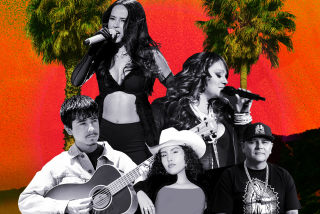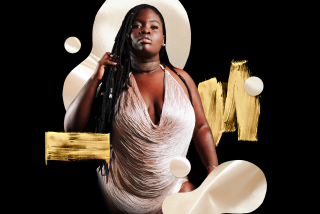Cuban salsa star now lives in U.S.
World-renowned salsa singer Issac Delgado has emigrated from Cuba and plans to pursue his career from a new home in Florida, becoming the biggest name in Cuban music in more than a decade to make the politically charged move away from the communist enclave.
Unlike the highly publicized defections in recent years of two other prominent Cuban vocalists, Manolin and Carlos Manuel, Delgado made his move under a cloak of secrecy. Internet chat rooms have been abuzz about the star’s whereabouts since late last year, but Delgado and his new U.S. business associates have kept mum until now.
This week, concert promoters were notified that the William Morris Agency had signed Delgado for worldwide representation. It was the first official confirmation that the rumors were true.
“Issac is probably the most significant singer of his generation,” said Michel Vega, head of Latin music for William Morris, in an interview this week from his Miami office. “We’re thrilled to be working with him and we think he’s going to be a great addition to the American music landscape.”
The critically acclaimed singer was not immediately available for interviews. But Vega confirmed that the artist has settled into a new home in Tampa, Fla., along with his wife and children. Details of his entry into the country were not disclosed.
Delgado is already recording a new album, in collaboration with award-winning salsa producer Sergio George, a key figure in the early success of New York salsa star Marc Anthony. The record is due in the spring, to be followed by a world tour this summer. Ten songs have been recorded so far, some featuring collaborations with major Latin artists, according to Adolfo Fernandez, spokesman for La Calle Records, a division of the Univision Music Group, which is expected to release the CD.
Despite the well-organized business plan, Delgado’s move is risky, as the careers of some of his fellow Cuban singers collapsed once they set foot in the U.S.
“Carlos Manuel is just a complete disaster,” said Hugo Cancio, a Miami businessman who was instrumental in bringing the young singing sensation to the U.S. “A great artist, tremendous talent, but he’s nowhere to be seen. He’s been here four years, and what has he done?”
Cuban artists who were superstars on the island have found scant interest for their style of complex and progressive salsa in the U.S., where tastes run more traditional. The handsome and charismatic Delgado, with his jazzy but smooth singing style, is probably the most marketable.
“He has a better chance than the other guys, but it still seems like a very questionable move,” said Kevin Moore, an expert in contemporary Cuban music who writes for the U.S.-based website Timba.com. “He always worked the best-paying gigs in Havana and lived in a beautiful palace. To leave all that behind for an unknown financial situation makes you wonder, ‘Why would he want to do that?’ ”
One potential answer: The political timing is right.
Delgado, who maintained good relations with the Cuban cultural authorities, may be trying to get a step ahead of political changes expected when Fidel Castro dies. A political opening on the island may close the doors on Cubans seeking to come to the U.S. because they could lose special asylum status, speculated Cancio. People in a democratic Cuba could be forced to get in line for U.S. visas with the rest of the world.
Manolin, who was a national celebrity in Cuba, where he performed as El Medico de la Salsa, said that artists who defect are led to believe they’ll be greeted with a red carpet, but after they arrive, the carpet gets pulled out from under them.
“Here in Miami, Cubans own the radio stations, run the record labels and control the television, but Cuban artists are the ones who get the least play,” Manolin said in Spanish from Miami. “It’s as if we come from a country that doesn’t exist. So it’s worse than starting over because there’s a need here to deny what comes from there. We are taboo.”
Manolin, who still performs in Miami though his career faltered after releasing a pop record on BMG that tanked, said he spoke to Delgado last year while his colleague was mulling his move. Manolin’s advice?
“You are a success already,” Manolin recalled telling his colleague. “You can come here and try to maintain what you’ve already achieved. But if you expect anything more, you’re going to be frustrated.”
Delgado was one of the first artists from Cuba to perform in the U.S., at Madison Square Garden in 1996. And he has released several albums on U.S.-based record labels, including qbadisc, RMM and AhiNama Music, based in Studio City.
Delgado was one of the most prominent stars to emerge in Cuba during Havana’s dance music boom of the 1990s.
In 1987, Delgado toured the world as a singer with Cuba’s Afro-Cuban cabaret from the Tropicana. He became a star a year later when he joined NG La Banda, the Havana group that sparked the new wave of dance music known as timba, a fusion of jazz, salsa and funk.
More to Read
The biggest entertainment stories
Get our big stories about Hollywood, film, television, music, arts, culture and more right in your inbox as soon as they publish.
You may occasionally receive promotional content from the Los Angeles Times.










